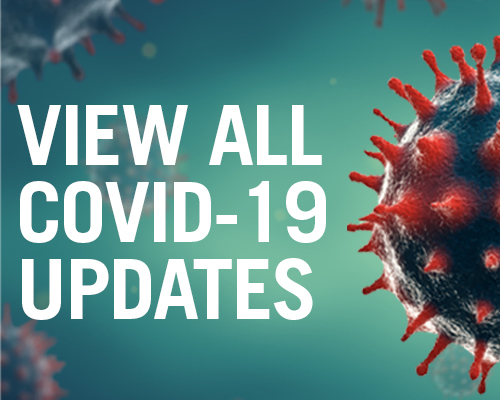INSPIRATION: No Dip in COVID-19 Deaths or Thromboses With Higher Anticoagulation Dose
The investigators say the negative results should discourage use of intermediate-dose strategies in critically ill patients.

In COVID-19 patients admitted to the ICU, intermediate-dose anticoagulant prophylaxis does not have an advantage over standard care in reducing deaths or venous or arterial thrombosis, according to early results from the multicenter, randomized INSPIRATION trial.
“Multiple people, myself included, have been concerned about the increased risk of thrombotic events in patients with COVID-19, and it's in that context that we were thinking perhaps some escalated dose regimens would be able to confer benefit. That being said, there was not much evidence,” senior author Behnood Bikdeli, MD (Brigham and Women’s Hospital, Boston, MA, and Yale University School of Medicine, New Haven, CT), told TCTMD.

The primary efficacy outcome in INSPIRATION, a composite of adjudicated acute venous thromboembolism (VTE), arterial thrombosis, treatment with extracorporeal membrane oxygenation (ECMO), or all-cause mortality within 30 days, occurred in 45.7% of the intermediate-dose group and 44.1% of the standard-dose group (P = 0.70).
In light of these results, published online ahead of print this week in JAMA, Bikdeli said hospitals that have adopted intermediate-dose anticoagulation as their routine treatment pattern should reconsider.
“In my humble opinion, I would caution against empiric escalated anticoagulation at this point, because the biggest question is: where is the evidence for it?” he added. In addition to INSPIRATION, interim results from the multiplatform collaboration of three other trials (ACTIV-4a, REMAP-CAP, and ATTACC) also indicate that intermediate dosing versus standard anticoagulant prophylaxis is ineffective at reducing the need for organ support in critically ill ICU patients with COVID-19. The multiplatform collaboration is ongoing, however, and the final analysis will be important, notes Hanny Al-Samkari, MD (Massachusetts General Hospital, Boston, MA), in an accompanying editorial.
According to Al-Samkari, “the preponderance of high-quality evidence at this time supports use of standard-dose thromboprophylaxis, not dose escalation, in critically ill patients with COVID-19. However, pending the publication of final results from the ATTACC, REMAP-CAP, and ACTIV-4a multiplatform trial confirming the interim report, escalated thromboprophylaxis could be appropriate in moderately ill hospitalized patients with COVID-19 while balancing known comorbidities and bleeding risks.”
Among the additional unknowns, Al-Samkari notes, are the utility of thromboprophylaxis after discharge, as well as the impact of outpatient thromboprophylaxis in those with mild COVID-19 illness who do not require hospitalization.
Questions, But No Signal
The INSPIRATION investigators, led by Parham Sadeghipour, MD (Iran University of Medical Sciences, Tehran), randomized 562 patients from 10 centers from Tehran and Tabriz between July and November 2020. The intermediate-dose group (n = 276) received enoxaparin at a dose of 1 mg/kg daily, while the standard-dose group (n = 286) received enoxaparin at a dose of 40 mg daily.
At 30 days, all-cause mortality was 43.1% in the intermediate-dose group compared with 40.9% in the standard-dose patients (P = 0.50). Similarly, rates of the other secondary outcomes, adjudicated VTE and ventilator-free days, were not significantly different between groups. Additionally, there was no advantage of intermediate dosing on the safety outcomes of major bleeding, clinically relevant nonmajor bleeding (BARC type 2), composite of major and nonmajor bleeding, or mild or moderate thrombocytopenia. Severe thrombocytopenia, defined as a platelet count less than 20 ×103/µL, was seen in six intermediate-dose patients and none of the standard-dose patients. A sensitivity analysis did not identify any subgroups in which use of intermediate-dose prophylaxis offered an advantage over standard dose on the primary outcome.
In the editorial, Al-Samkari notes that the study had a low rate of thrombotic events overall “raising the possibility of a significant number of uncaptured events.” However, Al-Samkari says early clinical COVID-19 studies that used universal VTE screening generally reported higher rates than those that did not use universal screening, which was the case with INSPIRATION.
“Is it some distinct difference for patients who were enrolled from Iran? Is it driven by the practice patterns? Is there a component of systematic underdiagnosis, or is it some component of all of these? I think [those are] fair questions,” Bikdeli told TCTMD, adding that he doesn’t think any of those scenarios drove the results.
“Suppose that some events were not captured. We should have seen a higher diagnostic yield from the ones who were tested. We did not see it. The proportion of people who tested positive was relatively low,” he explained. “Most importantly, if there were to be significant clots, and if intermediate dosing were protective, the mortality rates should have been different. At least there should have been a signal toward lower mortality, not the other way around.”
According to Al-Samkari, while critically ill patients have primarily been the focus of prophylactic dose escalation, patients with COVID-19 who are moderately ill and not in the ICU might actually be the ones most likely to benefit from the strategy.
“Substantial organ damage has already occurred by the time organ support is required, and therefore heparin-based anticoagulation during an earlier phase of the disease could mitigate microthrombotic and macrothrombotic complications before they occur or potentially exert a meaningful protective anti-inflammatory effect,” he writes.
L.A. McKeown is a Senior Medical Journalist for TCTMD, the Section Editor of CV Team Forum, and Senior Medical…
Read Full BioSources
Sadeghipour P, Talasaz AH, Rashidi F, et al. Effect of intermediate-dose vs standard-dose prophylactic anticoagulation on thrombotic events, extracorporeal membrane oxygenation treatment, or mortality among patients with COVID-19 admitted to the intensive care unit: the INSPIRATION randomized clinical trial. JAMA. 2021;Epub ahead of print.
Disclosures
- The study was funded by the Rajaie Cardiovascular Medical and Research Center.
- Sadeghipour reports no relevant conflicts of interest.
- Bikdeli reports being a consulting expert, on behalf of the plaintiff, for litigation related to two specific brand models of inferior vena cava filters.
- Al-Samkari reports receiving grants and personal fees from Agios and Dova; grants from Amgen; and personal fees from Argenx, Rigel, and Sobi outside the submitted work.





Comments